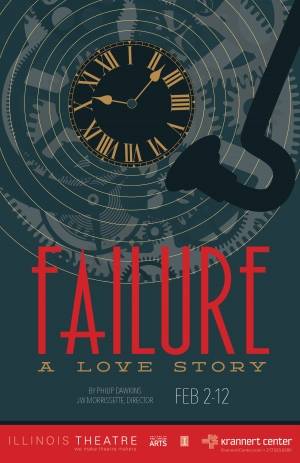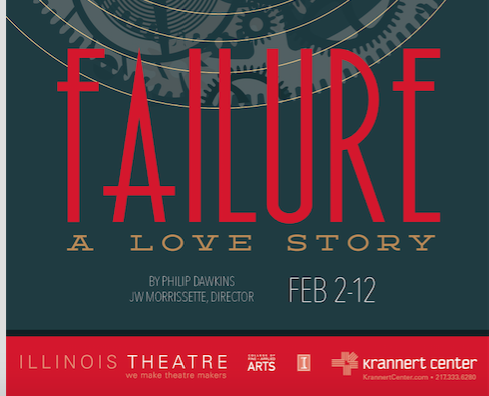Set in Chicago, Failure: A Love Story tells the story of the Fail family and how they each succumbed to death before Father Time closed his book on 1928. Audiences follow three Fail sisters —Nelly, Jenny June, and Gerty— along with their parents in their final years (except they don’t know that they will all come to untimely deaths). Along for the ride is Mortimer Mortimer, a young investor who falls for the Fail sisters’ charms. One wouldn’t think that a play about death is full of love, laughter, and joy, but it is. Written by up and coming Philip Dawkins, Failure is an open play that allows productions to explore the whimsy and fantasy of life and death. In the case of the Krannert Center for the Performing Arts’ production, this openness means the use of puppets for the play.
In order to learn more about Failure, I sought out a conversation with its director J.W. Morrissette. Morrisette is the Assistant Head for Academic Programs in the Department of Theatre at the University of Illinois at Urbana-Champaign. He has been at Illinois for almost two decades, and in that time, he has been an integral part of the theatre department. Morrissette has also taught and directed at Parkland College. To put it bluntly, he has done and he does a lot. Luckily, I was able to ask him a few questions about directing Failure, which opens Thursday February 2nd at the Krannert Center.
—
Smile Politely: What is your directorial style? For example, are you hands-on with your cast or do you let them explore the character on their own?
 J.W. Morrissette: My own approach to the work changes with the work and the makeup of the creative team. With a piece like Failure: A Love Story, we were all partners in the play. What I mean by that is the entire team needed to craft this beautiful play by Philip Dawkins with fantasy and exuberance. I needed to help provide a space for that and then try to get out of their way. I say try because there was such wonderment being found in rehearsal I found it impossible not to jump in and play along. It is also important to note we are a professional training program and as such the work they are learning about (technique and practice) in their classes is an equal part of the production work. So, it is a luxury to benefit from the outstanding training offered by the professors in the department.
J.W. Morrissette: My own approach to the work changes with the work and the makeup of the creative team. With a piece like Failure: A Love Story, we were all partners in the play. What I mean by that is the entire team needed to craft this beautiful play by Philip Dawkins with fantasy and exuberance. I needed to help provide a space for that and then try to get out of their way. I say try because there was such wonderment being found in rehearsal I found it impossible not to jump in and play along. It is also important to note we are a professional training program and as such the work they are learning about (technique and practice) in their classes is an equal part of the production work. So, it is a luxury to benefit from the outstanding training offered by the professors in the department.
SP: What do you find the most rewarding about directing?
Morrissette: I’ve been directing now for over 23 years, I guess, and nobody has ever asked me that question. I’m amazed it hasn’t come up and I’m sort of at a loss for an answer. If I had to, I would say I am a creature of the rehearsal space. I love rehearsal. I revel in the possibilities present in rehearsal and the discovery/exploration. I mean, sure, opening [a play] is usually wonderful, but the opportunity to gather with others to explore [a play] —that really is the reward. The delivery of the explorations to the audience is an extension of that process.
 SP: Do you have any interesting anecdotes about the cast of Failure that you would like to share with our readers?
SP: Do you have any interesting anecdotes about the cast of Failure that you would like to share with our readers?
Morrissette: This is the second time that I’ve had the privilege of working on this particular play. That in itself made things different for me because this is also the first time that I’ve ever directed a play for a second time — I love it that much. With this particular creative team, we started rehearsals the week before Thanksgiving. We went away for a week, and we came back for one week, and then we hit the five week winter break. Upon the start of the semester, we came back for another two and a half weeks. That spread of schedule made the process very immediate and concentrated. So much so that the team returned a week before classes started in order to accommodate an extra week. During that week we had the luxury of daytime rehearsals free from the conflicts of classes and work. This team filled that week with such amazing work that we often forgot that we were actually at work. I know none of that is terribly interesting; I should have just said we also to play with puppets and any time a group of creative folks have puppets to play with laughter abounds.
SP: You mention puppets…how are they worked into the play?
Morrissette: The puppets are a design solution to telling and fulfilling the fantastical quality of Dawkins’ script. Mr. Dawkins gives permission to explore the telling of the story in whatever way works best for the group staging the play. For us, that meant puppets.
SP: I see. Building off of that thought, I get the impression the play requires a lot of props and additional cast for some staging aspects, but those props and cast members aren’t necessarily essential to a production of Failure.
Morrissette: Oh, I would beg to differ. For this production, those props and cast members define Failure. Truly, since the start we’ve woven the elements of fantasy and a cast of fourteen into the very DNA of this project. Could you do the piece without them? Probably, but I would say you would miss out on the incredible talents of a gifted and incredibly exciting team of artists.
—
Performances of Failure: A Love Story start at 7:30 p.m. on Thursday, February 2nd to Saturday, February 4th and Wednesday the 8th to Saturday the 11th at the Krannert Center for the Performing Arts in the Studio Theatre. A matinee performance at 3:00 p.m. on Sun. Feb. 12th is also available. There is a free Talkback session where audience members can engage with the cast and crew following the performance on Thurs. Feb. 9th.
Sarah Keim is a contributing writer for Smile Politely’s Arts section. She’s a bit of recluse on social media, but you might bump into her out in the wilds of C-U. Frequent sightings occur at farmers’ markets, movie theaters, and libraries.









 Sarah Keim is a contributing writer for Smile Politely’s Arts section. She’s a bit of recluse on social media, but you might bump into her out in the wilds of C-U. Frequent sightings occur at farmers’ markets, movie theaters, and libraries.
Sarah Keim is a contributing writer for Smile Politely’s Arts section. She’s a bit of recluse on social media, but you might bump into her out in the wilds of C-U. Frequent sightings occur at farmers’ markets, movie theaters, and libraries.